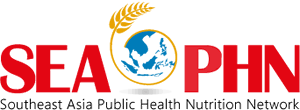The Southeast Asia Public Health Nutrition (SEA-PHN) Network is a
partnership of key stakeholders in the region, namely nutrition societies,
government agencies and corporate companies, dedicated to promoting public health nutrition among the population and alleviating nutrition problems in the region.
Rationale
Rapid advances in the socio-economy atmosphere of Southeast Asian countries in the last four decades has resulted in significant changes to the lifestyle of communities, including food consumption patterns. This in turn resulted in marked changes to the nutrition scene, namely a decline in nutrient deficiencies and a rise in the prevalence of diet-related chronic diseases (NCDs) among the population in the region.
Governments have re-aligned food and nutrition policies and action plans to address the nutrition problems. Nevertheless, it is also imperative that all stakeholders, including government agencies, academia, professional bodies and the private sector work together in combating those nutritional problems. Public health nutrition measures should remain as the key approaches.
Public health nutrition focuses on the application of food and nutrition knowledge, policy and research for the primary prevention of nutrition related disorder and the improvement of the health of the population.
We strongly believe that nutrition societies in the Southeast Asian region can play greater roles in supporting the government agencies. The private sector too can contribute their expertise as well as resources in promoting public health nutrition.
There are existing networks of nutrition societies in the region that are focused on scientific exchanges in all fields of nutrition. However, there is a need for a network among nutrition societies in the region that focuses on promotion of public health nutrition, in partnership with government agencies and the private sector for more effective implementation of public health nutrition measures.
Recognising the need for a regional nutrition network focused on public health nutrition, the Southeast Asia Public Health Nutrition (SEA-PHN) Network was established on June 2, 2014 with the aim of bringing together members interested in researching, applying and promoting public health nutrition among the population in the effort of alleviating the nutrition problems in the region.
“Southeast Asia Public Health Nutrition (SEA-PHN) Network was established on June 2, 2014.”
Objectives
- Establish and maintain an interactive network among public health nutritionists in the Southeast Asia region
- Promote the periodic exchange of experiences, activities in all public health nutrition issues, including nutrient deficiencies and diet-related chronic diseases
- Consolidate efforts among nutritionists, both in the public and private sector, for the advancement of public health nutrition
- Share available information and documentation with all stakeholders involved in public health nutrition, including professional bodies, government agencies and private sector
- Conduct activities to promote public health nutrition to benefit the communities in Southeast Asia region while ensuring avoidance of potential conflicts of interest.
- Promote and conduct collaborative projects amongst members of the SEA-PHN Network, government agencies and private sector for community nutrition improvement, in the spirit of public-private partnership.
Operational Framework
- Members of the Network shall comprise Nutrition Societies/Associations affiliated to the Federation of Asian Nutrition Societies (FANS). As the Network grows, other nutrition societies shall be invited to be part of the Network.
- A council shall be established to manage the activities of the Network. The founding members of the council are as stated in COUNCIL MEMBERS OF THE SEA-PHN NETWORK (2014 – 2017) under the About Us: Council Members. Subsequently, the council members shall be elected every three (3) years by the members.
- The activities of the Network shall be agreed upon by majority of the Council and managed by the said Council. Council shall decide if any proposd activity is a potential conflict of interest to its members.
- The conduct/running of the Network activities shall be facilitated by a Secretariat, oversee by the Council. The Council may appoint a third party in member’s country to help implement the local activities, should the need arise.
- Members of the Network (and the members within each national nutrition society/association) shall be eligible to participate in the planned activities.
-
Government ministries & agencies shall be invited to participate in Network activities as Associate Members, including:
- attend annual Network meetings
- collaborate in projects of the Network, and
- access to documents on the Network website
-
Private sector companies shall also be invited to participate in Network activities as Associate Members, including:
- provide financial support for the activities of the Network
- attend annual Network meetings (represented by appropriate technical experts)
- collaborate in projects of the Network, and
- access to documents on the Network website
